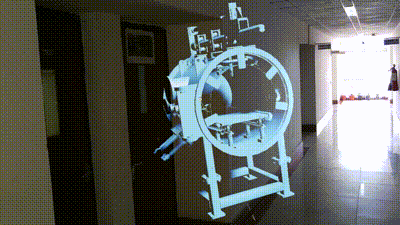The methodology involves several key steps:
3D Modeling: A complex three-dimensional model of the thermovac chamber is created using Creo Parametric software.
Optimization: The model is optimized in Blender to reduce complexity and enhance visual quality, focusing on essential components and eliminating trivial details.
Data Integration: Real-time data from the physical system are acquired and processed using Unity3D. The data, initially displayed on a web-based monitoring system, are converted from HTML to JSON format for better integration and manipulation.
.png)
Augmentation in AR/VR: The processed data are then augmented onto the DT within an AR environment on various platforms, including mobile and Windows, using the Mixed Reality Toolkit (MRTK) in Unity. This setup allows for real-time data updates and interactive visualizations.
Cross-Platform Deployment: The DT is deployed across multiple devices, including mobile platforms, desktop machines, and AR/VR headsets like Microsoft HoloLens and Oculus, ensuring wide accessibility and user interaction flexibility.

The study showcased the substantial improvements in the testing processes of space hardware with the development and implementation of a Digital Twin (DT) for a thermovacuum chamber. Enhanced visualization and interaction capabilities were achieved through the integration of augmented reality (AR) and voice commands, allowing engineers to interact seamlessly with the DT. This facilitated intuitive monitoring and manipulation of data, reducing the reliance on physical controls. The real-time data access feature of the DT provided live updates on critical parameters like temperature and pressure, enabling quick identification and resolution of issues, thereby maintaining the integrity and safety of the space hardware.
.png)
The immersive and interactive experience provided by the DT significantly aided decision-making processes, allowing engineers to make informed decisions swiftly and effectively. Additionally, the project demonstrated a cost-effective approach to developing and implementing advanced testing technologies by leveraging in-house software development and existing AR and IoT tools, which proved economically viable and scalable for broader applications. Overall, the results highlighted the transformative potential of digital twin technology in enhancing the efficiency, safety, and cost-effectiveness of space hardware testing processes.